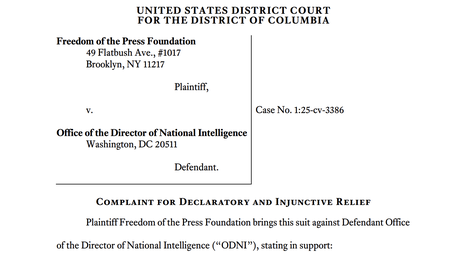Three new FPF FOIA suits target threats to transparency, press freedom


AP Illustration
The Freedom of Information Act gives the public a right to access government records.
The Freedom of Information Act is supposed to shed light on government activity by giving journalists and the public access to government records. But the law is in shambles. From endless delays in response time and unjustified refusals to ridiculously overbroad redactions, FOIA is plagued with problems.
We must fight back against the government’s refusal to comply with FOIA and urge Congress to reform the law and end backlogs of requests, reduce the number of exemptions, and overturn damaging court decisions.

FOIA office firings thwart congressional oversight

Plus: Tulsi Gabbard wants to declassify information that “serves the public interest.” But who is determining what’s in the public interest?

Hearing coincides with rapidly deteriorating information environment

Plus: Which FOIA offices might be closed next

The White House isn’t complying with the Presidential Records Act (again)

Plus: Is Trump getting ready to change classification rules?

Plus: Wired drops FOIA reporting paywall. Will other media outlets follow?

Plus: Catch us on NPR while you still can

Despite a judge ruling DOGE is “likely covered” by FOIA, it’s not a guarantee its records will soon see the light of day

FOIA is in trouble and we need congressional help to fix it
Something went wrong and your email updates subscription could not be processed. Please visit our signup page and try again.
Thanks for helping us protect FOIA and the right of the press and public to know what the government is up to.
Share this message on social media: